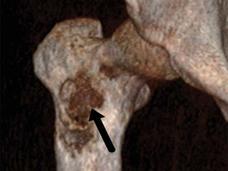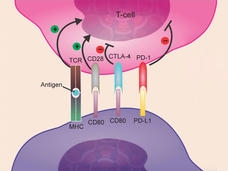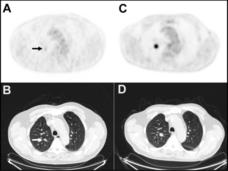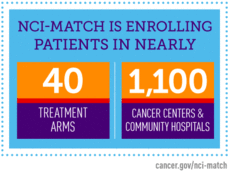Cancer Currents: An NCI Cancer Research Blog
A blog featuring news and research updates from the National Cancer Institute.
-
Immunotherapy Effective in Alveolar Soft Part Sarcoma
People with advanced alveolar soft part sarcoma (ASPS), a rare cancer, appear to benefit from a type of immunotherapy called an immune checkpoint inhibitor, according to results from a small clinical trial.
-
Atezolizumab Approved for Initial Treatment of Metastatic Lung Cancer
On December 6, 2018, the Food and Drug Administration (FDA) approved atezolizumab (Tecentriq) in combination with a standard three-drug regimen as an initial treatment for advanced lung cancer that does not have EGFR or ALK mutations.
-
For Early-Stage Lung Cancer, Study Identifies Potential New Biomarker, Treatment Target
A new study has identified a potential biomarker of early-stage non–small cell lung cancer (NSCLC). The biomarker, the study’s leaders said, could help diagnose precancerous lung growths and early-stage lung cancers noninvasively and distinguish them from noncancerous growths.
-
New on NCI Websites for December 2018
NCI periodically provides updates on new websites and other online content of interest to the cancer community. See selected content that has been added as of December 2018.
-
FDA Approvals Bring New Options for Older Patients with AML
FDA has approved venetoclax (Venclexta) and glasdegib (Daurismo) for use in people with acute myeloid leukemia aged 75 and older and those with health conditions that prevent them from receiving the intensive chemotherapy regimen that is the standard initial treatment.
-
The HPV Vaccine: Increasing the Use of an Important Cancer Prevention Tool
Dr. Barbara Rimer, chair of the President’s Cancer Panel, summarizes the panel’s recent report on the HPV vaccine, which includes priorities and strategies to ensure that more people receive this critical cancer vaccine.
-
Whole- and Partial-Breast Radiation Effective at Preventing Breast Cancer from Returning
In women with early-stage breast cancer, two clinical trials have shown that both whole- and partial-breast radiation therapy are effective at preventing the cancer from returning after breast-conserving surgery.
-
Plans for NCI’s Fiscal Year 2019 Budget
NCI Director Dr. Ned Sharpless describes important decisions NCI leaders have recently made with respect to the institute’s fiscal year 2019 budget, including those related to the Cancer Moonshot and early-stage investigators.
-
Drug Combination May Target the Unique Metabolism of Leukemia Stem Cells
Two new studies show how the drugs venetoclax (Venclexta) and azacitidine (Vidaza) team up to block the unique metabolism of leukemia stem cells and may explain why the drug combination is effective against acute myeloid leukemia.
-
Vitamin D Supplements Don’t Reduce Cancer Incidence, Trial Shows
In the largest-ever randomized trial testing vitamin D for cancer prevention, the supplement did not lower the risk of developing cancer. The Vitamin D and Omega-3 Trial (VITAL) includes a nationally representative sample of nearly 26,000 participants.
-
Targeted Treatment for Rare Digestive Tract Cancers May Extend Survival
In an early-phase trial, dabrafenib plus trametinib shrank tumors in patients with biliary tract cancer and adenocarcinoma of the small intestine whose tumors had a specific mutation in the BRAF gene.
-
Can Topical Drugs Help Prevent Breast Cancer?
Researchers are testing a topical-gel form of the drug tamoxifen to see if it can help prevent breast cancer as effectively as the oral form of the drug but with fewer side effects.
-
Genomic Test Helps Identify Thyroid Nodules That Don’t Require Surgery
The test measures genomic changes in thyroid biopsy samples and generates a score based on how strongly each change is associated with thyroid cancer. A study showed the test accurately identified samples that, after surgery, were found to be benign.
-
Tailored Radiation to Treat Brain Metastases Reduces Impact on Cognitive Function
Results from a clinical trial suggest that, in patients with brain metastases, an advanced radiotherapy technique limits harm to patients’ cognitive function without affecting the treatment’s effect on tumors.
-
Olaparib after Initial Treatment Delays Ovarian Cancer Progression
In a recent trial, the PARP inhibitor olaparib substantially delayed ovarian cancer from coming back after the first line of chemotherapy. Could the findings change the standard of care for newly diagnosed ovarian cancer with a BRCA mutation?
-
The Cancer Moonshot: Moving from Planning to Research
Dr. Dinah Singer, co-chair of the Cancer Moonshot Blue Ribbon Panel, provides an update to the cancer community on the science being supported under the Moonshot initiative.
-
NCI-MATCH Update: More Labs, New Arms, and Initial Findings
NCI’s Dr. Lyndsay Harris provides an update on the NCI-MATCH trial, including the opening of new trial treatment arms and the addition of new laboratories to perform testing on tumor samples of prospective trial participants.
-
Gene Tied to Alzheimer’s May Be Associated with Cancer-Related Cognitive Problems
Findings from a clinical study and a mouse study may shed light on genetic risk factors for developing cancer-related cognitive problems in older breast cancer survivors. The results suggest a gene associated with Alzheimer’s disease may play a role.
-
Eight Factors May Link Disparities in Cancer Death Rates and Income
Eight factors may explain more than 80% of the relationship between poverty and disparities in cancer death rates at the county level, according to a new study. The largest mediator was a surprise to the researchers.
-
Blood Test Shows Promise for Detecting Genetic Changes in Brain Tumors
A liquid biopsy blood test can detect DNA from brain tumors called diffuse midline gliomas, researchers have found. This minimally invasive test could be used to identify and follow molecular changes in children with these highly lethal brain tumors.




















